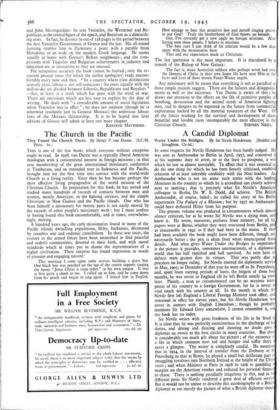The Church in the Pacific
Tins is one of the few books which everyone without exception ought to read. In 1938, van Dusen was a typically liberal American theologian with a conventional interest in foreign missions in that year membership of the great international missionary conference at Tambaram, and an extended tour in Indonesia and the Pacific, brought him for the first time into contact with the world-wide Church as a living reality. Since then he has become perhaps the most effective living propagandist of the world mission of the Christian Church. In preparation for this book, he has sorted and studied many hundreds of records of contacts between men and women, mostly American, in the fighting services, and the simple Christians in New Guinea and the Pacific islands. One who has been himself a missionary for twenty years is not easily moved by the records of other people's missionary work ; but I must confess to having found this book uncomfortably, and at times, overwhelm- ingly, moving.
A hundred years ago, the early missionaries found in many of the Pacific islands dwindling populations filthy, barbarous, decimated by ceaseless war and endemic cannibalism. In these war years, the visitors in the armed forces have been astonished to find peaceful and orderly communities, devoted to their faith, and with moral standards which at times put to shame the representatives of a higher civilisation. Their surprise has found expression in words of pleasant and engaging naiveté :
This morning I came upon some natives building a grass hut. One black boy was perched on the top of the centre support singing the hymn "Jesus Christ is risen today" in his own tongue. It was at first quite a shock to me. I called up to him, and he came down from his perch and began to sing again. I joined him in English. How strange to hear this primitive boy and myself'singing praises to our God! Truly the brotherhood of God knows no bounds. Gee, I've certainly got a new angle on foreign missions. After having seen these people, I believe in missions.
The best cure I can think of for atheism would be a few days spent with the missionaries here.
That and our experiences made us Christians.
The last quotation is the most important. It is elucidated by a remark of the Bishop of New Guinea: The fact is, many Australian sokliers who perhaps never had seen the likeness of Christ in their own .home life have seen Him in the faces and lives of those brown Fuzzy-Wuzzy angels.
Any missionary will be aware that everything is not as paradisal as these simple records suggest. There are the failures and disappoint- ments as well as the successes. Van Dusen is aware of this ; he draws our attention to the effects on the life of primitive peoples of bombing, devastation and the animal needs of American fighting men, and to dangers to be expected in the future from commercial exploitation backed by all the material resources of the West. Of all the forces working for the survival and development of these beautiful and lovable races incomparably the most effective is the


























 Previous page
Previous page